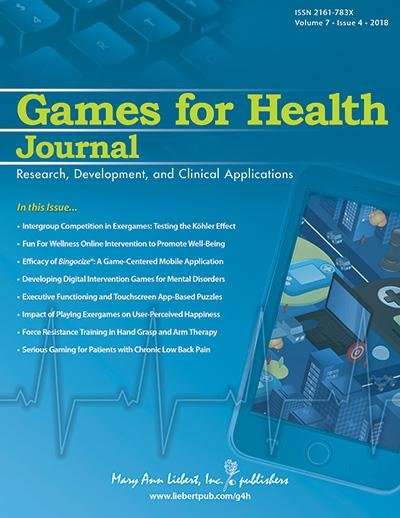Digital games show potential to improve cardiovascular disease-related exercise outcomes

A scoping review of studies on game interventions for cardiovascular disease (CVD) self-management found that the use of digital games improved exercise capacity and energy expenditure significantly. Average adherence rates for the game interventions ranged from 70% to 100% across all studies, and they were enjoyed by a majority of participants in studies that assessed perceptions of the interventions. However, the use of digital games did not affect quality of life, self-efficacy, anxiety, or depression, as reported in Games for Health Journal, a peer-reviewed publication from Mary Ann Liebert, Inc., publishers.
Recent research evidence on game interventions for CVD-related self-management behaviors in patients diagnosed with coronary artery disease, heart failure, hypertension, or myocardial infarction was examined in the article entitled "Role of Digital Games in Self-Management of Cardiovascular Diseases: A Scoping Review ." The review is coauthored by Kavita Radhakrishnan, Ph.D., RN, MSEE and colleagues from The University of Texas at Austin and Tom Baranowski, Ph.D., Editor-in-Chief of Games for Health Journal, from USDA/ARS Children's Nutrition Research Center and Department of Pediatrics, Baylor College of Medicine, Houston, TX. Based on the findings of their review, the authors recommend that future research includes longer study durations and larger sample sizes, game design that is informed by theoretical frameworks for behavior change, and additional CVD self-management behaviors.
"Heart disease is the leading cause of mortality in the US and in much of the western world. Compliance with the self-care prescriptions for the heart-related disease therapies tends to be low. Games may provide a method for reaching large numbers of heart disease patients to teach easy to learn self-care practices in an enjoyable manner," says Dr. Baranowski. "This article reviewed eight studies of games for heart disease self-care, mostly done in Europe. Most of these studies reported positive health or behavioral outcomes, but the promise of games needs to be more thoroughly assessed. Stay tuned!"
More information: Kavita Radhakrishnan et al, Role of Digital Games in Self-Management of Cardiovascular Diseases: A Scoping Review, Games for Health Journal (2018). DOI: 10.1089/g4h.2018.0011




















